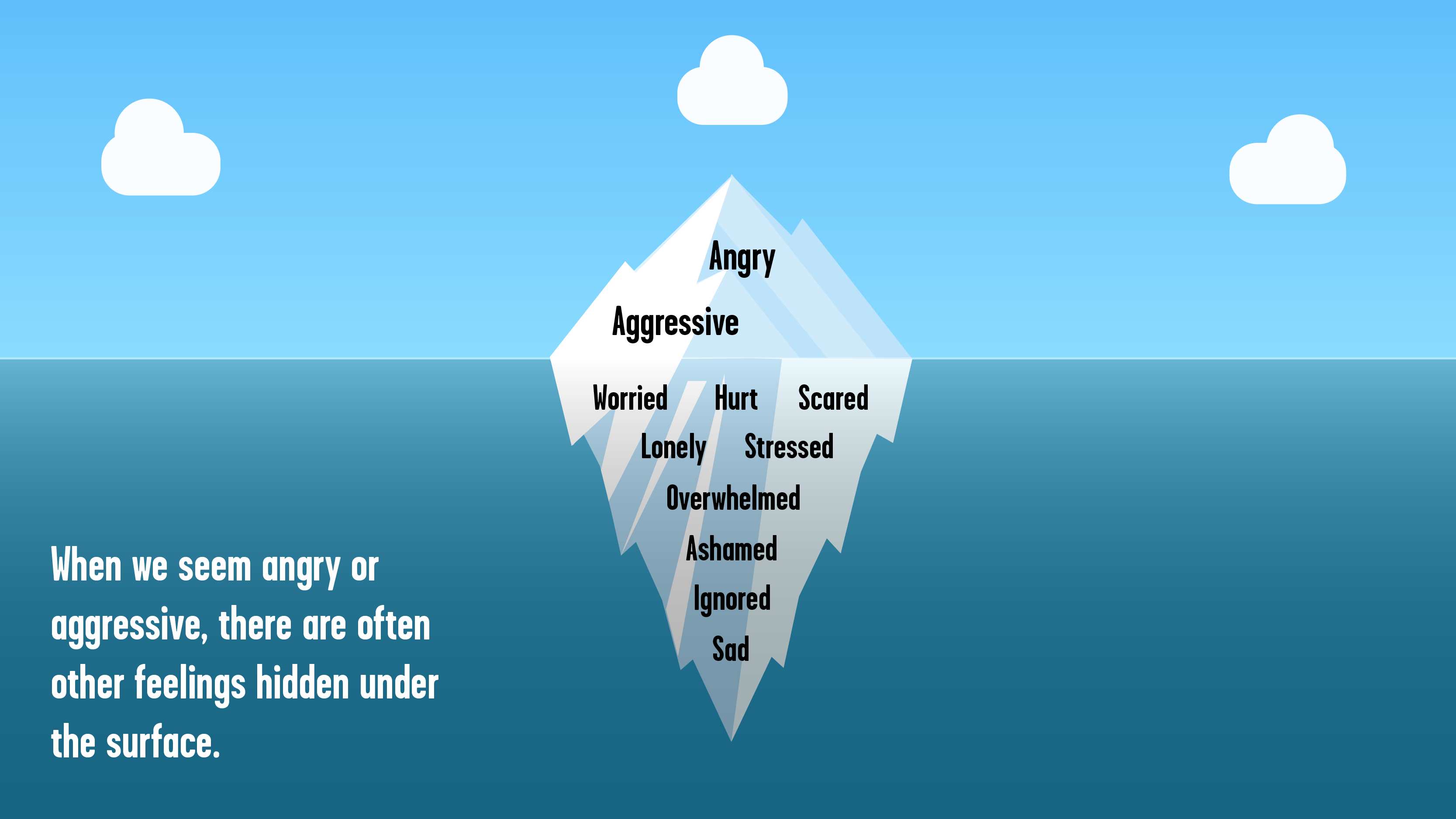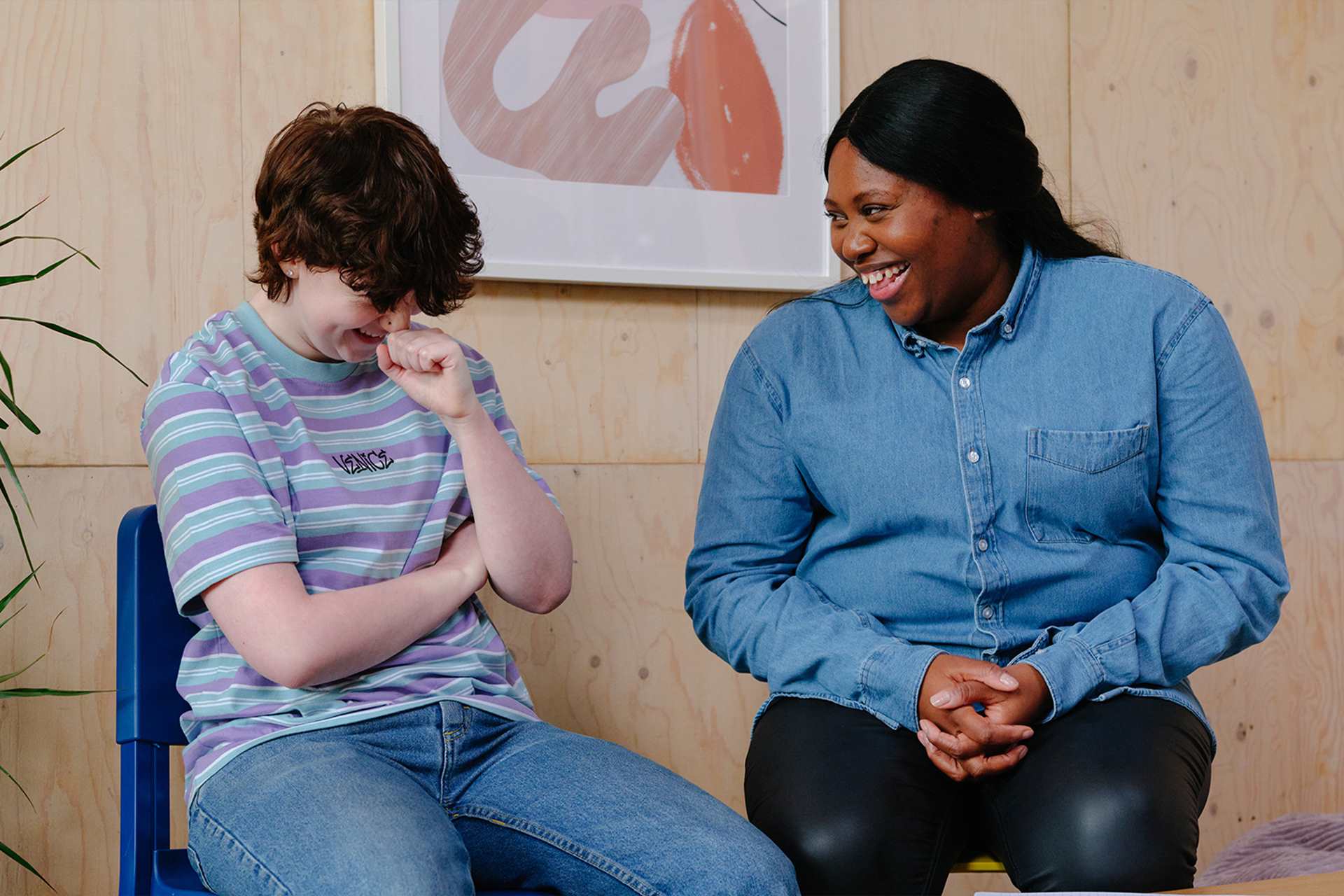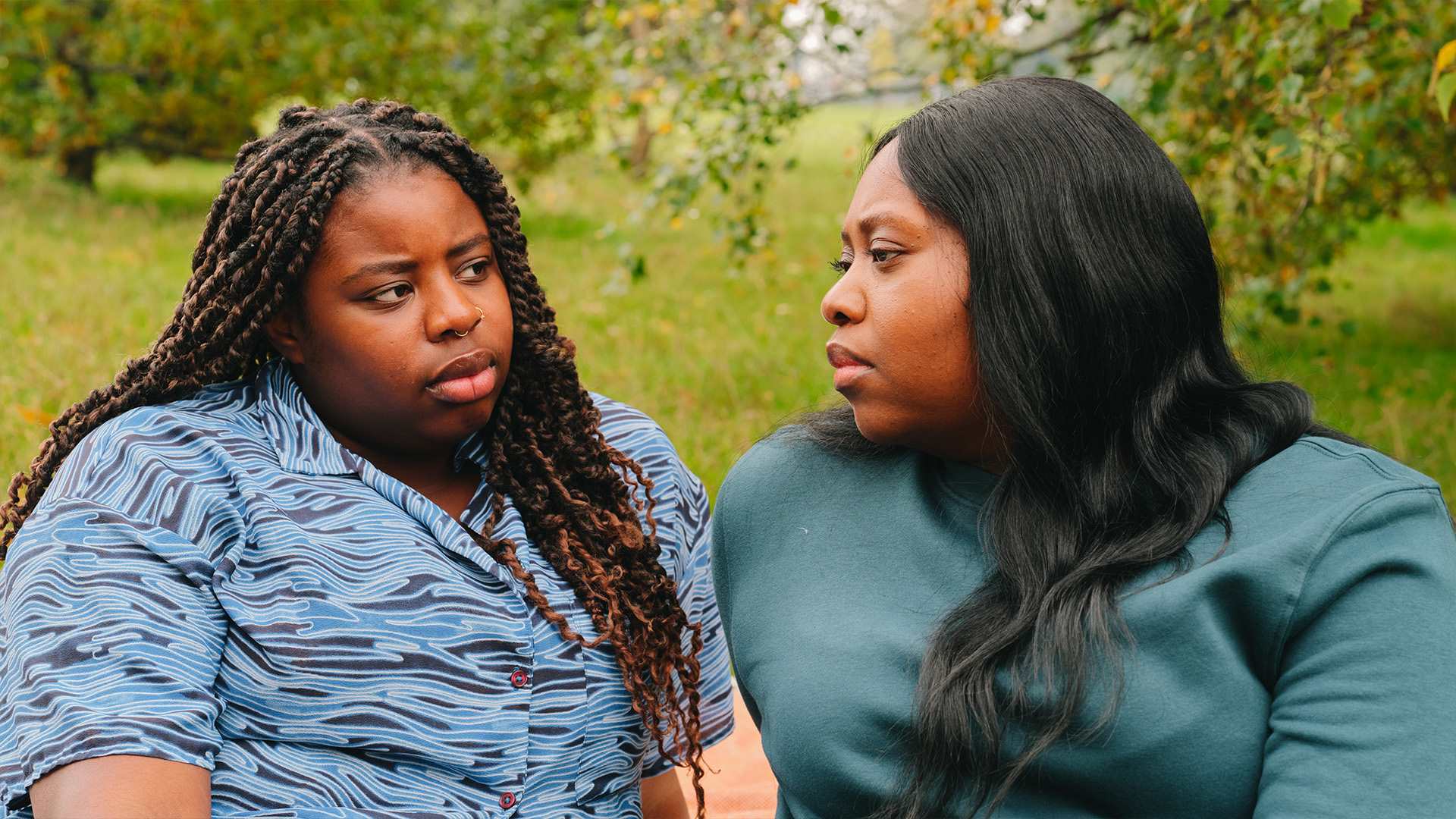What is anger?
We all feel angry sometimes. This is a normal part of growing up and being human. Sometimes, feeling angry can be a helpful sign that something's not okay with us. It can also give us the strength and energy we need to challenge or change something.
Anger can boil over for all kinds of reasons, especially when we’re tired or stressed. It’s also a common reaction to situations that feel unfair, unsafe or out of our control. This can be the case when a young person:
- goes through big changes in their family, like their parents separating or someone dying
- experiences bullying or abuse
- experiences discrimination like racism, homophobia or ableism
When I’m angry I feel a lot of self-hate and worthlessness. I also feel a build-up of energy.
When is anger a problem?
It’s normal for children and young people to find it difficult to manage angry feelings sometimes. This is because the part of our brain that helps us to manage our emotions is not fully developed until our mid-20s. Teenagers also go through lots of hormone changes during puberty, which can make emotions feel more intense.
When anger is feeling harder to manage, a child or young person may:
-
Be outwardly aggressive
For example by shouting or lashing out.
-
Be inwardly aggressive
For example by being hard on themselves.
-
Be passively aggressive
For example by ignoring people or being sarcastic.
Lots of children and young people will act in these ways sometimes. But anger can start to become a problem if it:
- makes them feel overwhelmed, unhappy or bad about themselves
- affects their relationships
- gets expressed through physical aggression towards other people
- gets expressed through harmful behaviour towards themselves, including self-harm
When anger's like this, there are often other feelings going on too. This can include things like fear, sadness, grief and hurt. Sometimes, feeling irritable over a prolonged period of time can be a sign that a young person is struggling with low mood. It can also be a way of communicating that something in their life isn't quite right.

An iceberg submerged in water, with the text 'When we seem angry or aggressive, there are often other feelings hidden under the surface'. The words Angry and Aggressive are displayed on the section of the iceberg above the water, and the words Worried, Hurt, Scared, Lonely, Stressed, Overwhelmed, Ashamed, Ignored, Sad are displayed on the iceberg below the water.
Responding to angry or aggressive behaviour
When your child or young person is showing angry behaviour, try to:
Sometimes, a young person can get so angry that they become aggressive. If this happens:
- Remove yourself and other family members from the situation, if it feels safe enough to do so.
- Try calling another adult who your young person trusts and who may be able to help calm the situation down. This might be a family member of a family friend.
If you cannot remove yourself or calm things down, and you feel like anyone is at risk of harm:
- Give a warning about calling the police. Let your young person know that you will need to contact the police if the aggression does not stop.
- If they continue to act aggressively and you feel like anyone is unsafe, call the police. Call 999 if there is a danger to life or if violence is being used or threatened. Call 101 in a non-emergency situation to talk to a local police officer.
Calling the police in this situation if often an incredibly difficult thing for any parent or carer to do. You might feel worried about getting your young person into trouble. But it’s always important to put safety first.
Supporting your child or young person to manage anger positively
In a calm moment, gently check-in about how they’re doing. Give space for them to talk and show you’re listening to what it’s like for them. Remember that someone who’s feeling angry a lot of the time probably isn’t feeling very happy. Explore together what’s making them feel this way.
These kinds of conversations can support you child or young person to put their feelings and experiences into words. This can help to make their emotions feel less overwhelming. Trust your instincts about choosing the right moment for a chat. If they say no, you can always try again another time.
It might help to text or message them instead. Or you could try starting a conversation while you’re on a walk or drive together. This can make things feel more relaxed for both of you and make it easier for them to open-up.
Help them to understand the things that make them angry. Keeping a diary or journal may make it easier for them to think this through. Teenagers can also use an app such as HeadSpace to track their feelings.
Support them to identify what types of things help them manage and express their anger. Remember that different things work for different people. Some young people will find that active strategies work. Others might prefer relaxing activities. Or, different strategies might work in different situations.
Active strategies include:
- going for a run or walk
- playing sport
- having a shower
- ripping or screwing up paper
- throwing a ball
- hitting a pillow
- listening to loud or angry music
Relaxing activities include:
- listening to calm music
- listening to a meditation on an app such as Headspace or Calm
- colouring or drawing
- taking deep breaths
- doing a breathing technique such as breathing out for a few counts longer than they breath in, which can help their body relax
- writing down how they’re feeling
When things are calm, think together about what happens when they’re angry. How would they like you to respond? What strategies will they use to help them express their anger? The more involved your child or young person is in this discussion, the more likely they are to engage later on.
Your boundaries as a parent or carer need to adapt as your child or young person gets older. But it’s still important to keep a stable foundation in place. Hold appropriate boundaries and be consistent in how you respond to their behaviour. Remember that when they get really angry, they might also feel frightened or out of control. Even though they might resist them, appropriate boundaries are important.
Your child or young person will learn a lot from the way they see you behaving. When you show them how you’re coping with your big feelings, it will them learn how to cope with theirs. Here are some examples of things you could say:
- ‘I’m feeling cross and frustrated about this, I’m going to take a break for a few minutes’
- ‘This is really frustrating, let’s take some deep breaths’
- ‘I’m sorry I got angry earlier. I was feeling tired and stressed. I’m really sorry I shouted’
If they’re struggling, there are places where they can find help and support.
Young people tell us it helps to:
- think of the bigger picture: will this bother me in a year?
- try and say why you're angry, and remember that time alone to calm yourself down is okay
- take some time to think about how your actions are affecting others, and try to remember people are usually trying to help you
- apologise if you have harmed someone – and if you have hurt yourself, apologise to yourself
- figure out why you reacted like that so you can recognise it next time before it's too late
- tell someone if they’ve made you angry, or talk to someone else about it
- remind yourself that the emotion is valid
Where can I find professional help?
If anger affects their daily life or relationships over a longer period of time, it’s a good idea to get professional advice. These are four good places to start:
Counsellors and therapists can help your child or young to make sense of how they’re feeling. They can also work with them to find ways of coping. Therapists working with younger children will do this through play and creative activities.
You can find out how to access counselling in our guide for parents and carers.
The GP can talk about what’s going on and give you information about local services that may be able to help. If needed, they can also refer your child to the NHS service for young people’s mental health, known as CAMHS.
You can find out more about how GPs can help in our guide for parents and carers.
Some schools offer free counselling services to their students. Alongside this, they can often provide support such as mentoring, peer buddying, drop-ins and clubs.
Sometimes, challenging behaviour can be a sign of an additional need or developmental difficulty. This can include neurodiverse conditions such as autism or ADHD. It can also include difficulties with hearing and speaking. If you’re concerned about this, talk to their teacher or the school’s SENCO. If needed, they can make a referral for an assessment. You can also speak to your GP about this.
Early Help is a service offered to families through local authorities. It can support with challenges that do not yet meet the threshold for other services such as CAMHS. It might include things like:
- parent support, such as mentoring or groups
- emotional and social support for young people
- supporting with accessing other local services
You can find out more about Early Help in our guide for parents and carers.

Looking after yourself as a parent
Angry and aggressive behaviour can be really tough to be on the receiving end of. Be kind to yourself if things are difficult at the moment. Remember that if your child or young person is acting out, it’s sometimes because they see you as a safe person who they can express their feelings with. It isn’t necessarily about you.
These are some things that can help you take care of yourself:
-
Pick your battles
Sometimes, when there’s lots of conflict, it’s easy to lose our perspective. Try to take a step back and see the bigger picture. Choosing to let the little things go will be better for your own wellbeing.
-
Take time out
Say ‘yes’ to offers of support from family and friends. Make time for talking to friends and people you trust. Sometimes you might just need a space where you can offload a bit.
-
Plan fun activities
Spending positive time with your child or young person can shift the dynamic and give you an important sense of wellbeing as a parent or carer. You could watch a TV series, have a movie night, cook something new or do an activity you both enjoy.
If the situation is starting to affect your own mental health, think about where your support comes from. Remember you can always speak to your GP about what might help. You can also look into local counselling or therapy services. Having someone who’s listening to and supporting you can make a big difference.
Useful helplines and websites
While we take care to ensure that the organisations we signpost to provide high quality information and advice, we cannot take responsibility for any specific pieces of advice they may offer. We encourage parents and carers to always explore the website of a linked service or organisation to understand who they are and what support they offer before engaging with them.
-
YoungMinds Parents Helpline
We support parents and carers who are concerned about their child or young person's mental health. Our Parents Helpline provides detailed advice and information, emotional support and signposting.
You can speak to us over the phone or chat to us online.
You can speak to us over webchat between 9.30am and 4pm from Monday-Friday. When we’re closed, you can still leave us a message in the chat. We’ll reply to you by email in 3-5 working days.
- Opening times:
- 9.30am-4pm, Monday-Friday
-
Family Line
Provides information and support around family issues, as well as longer-term help through Befrienders and Counsellors.
- Opening times:
- 9am - 9pm, Monday - Friday
-
Family Lives
Emotional support, information, advice and guidance on any aspect of parenting and family life.
- Opening times:
- 9am - 9pm, Monday to Friday; 10am - 3pm at weekends
-
PEGS
Provides support for parents experiencing child to parent abuse, including physical, emotional, psychological, verbal, sexual or financial abuse.
You can refer yourself for help through their website, and can access peer support groups, parenting programmes, 1:1 consultations and advocacy support.
-
Children 1st Parentline
Support for families living in Scotland. You can call their helpline for parenting support and advice on any issue, including challenging behaviour, divorce and separation, stress, or money worries. You can also find lots of information on their website.
You can also speak to someone over web chat.
- Opening times:
- Monday - Friday, 9am - 9pm; Saturday - Sunday, 9am - 12 noon
-
Parenting Focus
The leading charity for parenting support in Northern Ireland. They provide help and advice through their support line, and parent programmes and workshops across Northern Ireland.
- Opening times:
- 9.30am-3.30pm, Monday-Thursday; 9.30am-12.30pm on Fridays
-
Childline
If you’re under 19 you can confidentially call, chat online or email about any problem big or small.
Sign up for a free Childline locker (real name or email address not needed) to use their free 1-2-1 counsellor chat and email support service.
Can provide a BSL interpreter if you are deaf or hearing-impaired.
Hosts online message boards where you can share your experiences, have fun and get support from other young people in similar situations.
- Opening times:
- 24/7
-
Tellmi
Formerly known as MeeToo. A free app for teenagers (11+) providing resources and a fully-moderated community where you can share your problems, get support and help other people too.
Can be downloaded from Google Play or App Store.

This page was reviewed in April 2024.
It was created with a parent or carer with lived experience of supporting their child or young person with anger.
We will next review the page in 2027.
YoungMinds is a proud member of PIF TICK – the UK's quality mark for trusted health information.
Whether you love the page or think something is missing, we appreciate your feedback. It all helps us to support more young people with their mental health.
Please be aware that this form isn’t a mental health support service. If your child is in crisis right now and you want to talk to someone urgently, find out who to contact on our urgent help page.
At YoungMinds we take your privacy seriously. If you’d like to read more about how we keep the information we collect safe, take a look at our privacy policy.

